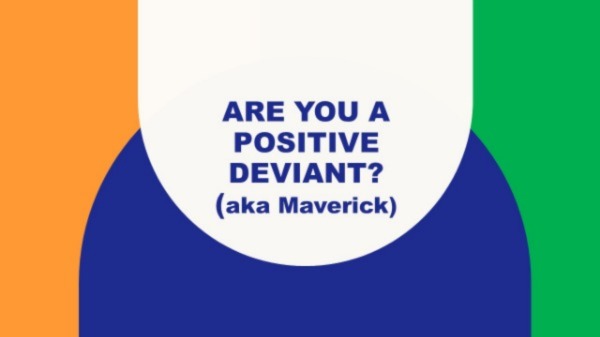Are You a Positive Deviant?

I was recently described by a colleague as being a positive deviant. When she saw me flinch, she instead suggested I was a maverick. While she clearly thought both terms were complimentary, I’m not sure everyone would agree.
After all, does anyone say, ‘I want to be a positive deviant when I grow up?’ Is it even a conscious choice? More likely, colouring outside the lines is something one is wired to do.
Regardless, research does indicate that Positive Deviance (PD) is based on the observation that in every community there are certain individuals or groups whose uncommon behaviors and strategies enable them to find better solutions than others.
While I’m not sure why, I’ve always been interested in positive deviants – aka mavericks, innovators, and activists who wanted to make the world a better place.
For me the seeds of that interest were planted when I was quite young. My father had been sent to Detroit for training related to his new position in management at GM. Knowing how much I loved to read, he brought me back a book called, ‘Nurses Who Led the Way’.
Florence Nightingale
One of my favourite stories from the book focused on Florence Nightingale. Without a doubt she would be considered a positive deviant or maverick because, as difficult as it seems to believe now, she was the first to make hygiene a priority among those who were ill or injured.

Despite significant opposition to her ideas, she was credited with reducing the hospital death rate by two-thirds during the Crimean War.
How She Used Data
Nightingale’s post war analysis of the mortality data showed that ten times more soldiers died from illnesses such as typhus, typhoid, cholera, and dysentery — not the actual battles.
She was a woman ahead of her time because she used data to understand the current situation, evaluate priorities, and assess how outcomes could be improved.
The Challenge of New Ideas
Fortunately, Nightingale also had the courage to speak up and challenge the traditional medical authorities. As a result, even though new ideas have a tendency to create discord, make people feel uncomfortable, or rattle a sense of security, she was able to advance safe, collaborative, high-quality care.
The Downside of Being a Positive Deviant
The challenge is that positive deviants are sometimes viewed by others as being a threatening “thorn in our side”. Like Nightingale, they question, criticize, and suggest improvements for existing practice and future direction.
Not surprisingly, and to the detriment of innovation and growth, positive deviants aren’t typically valued or promoted as much as one would expect.
I once heard from a colleague who is employed by the government that she had been told by her director — as if it were a negative attribute — that she was too innovative to be working as a public servant.
How to Harness the Potential
At a time in history when it has never been more important to be innovative and transformative, what can we do to harness the talent of positive deviants or mavericks and the innovation and transformation they are capable of generating?
Positive deviants will need the patience, time, support, and funding of those in positions of authority and power.
Since they are often ahead of their time, they may bring ideas forward before they are fully shaped and therefore may appear irrelevant. It often takes patience and deep conversations to clarify their innovations. This is especially true if their original concepts don’t tick all the boxes, still need refinement, or don’t fit within the existing priorities of funders or senior management.
Far too often, entire concepts are dismissed – especially by traditional thinkers who may not like having their status quo challenged. Sometimes in order to protect their own turf, they may even question or undermine the credibility of those presenting new ideas leaving the innovator disheartened and discouraged.
The Importance of Positive Deviants
Bottom line is that while business, government, and organizations may sometimes ignore or dismiss positive deviants and mavericks because of the uneasiness or irritation they provoke, it could be to the detriment of us all.
If we are to reflect, dream, and have hope for a better world, our future must be far more than tweaking what currently exists. Instead we need to prioritize working collectively and collaboratively to scale transformative change. And, the positive deviants, innovators, and mavericks, will be the ones to help us get there.
—————-
Posted on 11-06-22
Next entry: The Soft Side of Innovation
Previous entry: The Tattoo That Made Me Want One

 Brenda Herchmer is the owner of Grassroots Enterprises, a community development consulting company.
Brenda Herchmer is the owner of Grassroots Enterprises, a community development consulting company.